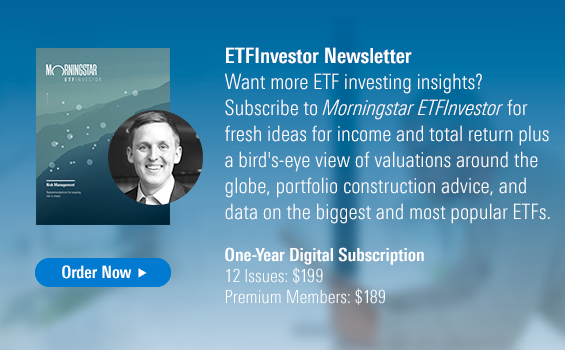This Fund's Recent Surge Comes From Its Sector Bets
Be aware of this fund's heavy tech-sector exposure.
Roughly half the fund's portfolio is invested in the technology sector, which is a source of risk. Its exposure to this sector was less than a fourth of the portfolio at the end of December 2012. Any negative developments in the sector could significantly hurt the fund’s return. This concentration is driven by growth-oriented companies such as
The fund's sector concentration risk is partially offset by its high-credit-quality orientation. About 70% of its holdings are investment-grade companies, whereas the typical fund in the convertibles Morningstar Category has only a fourth of its portfolio invested in securities issued by BBB or higher-rated entities. The fund's interest-rate-risk profile is on par with the category mean.
Buoyed by the rise of high-tech stocks, the fund had a spectacular run. Its five-year annual return through June 2017 was 11.4%, handsomely beating the category average of 8.4%. However, the fund trailed its benchmark by 1.1% because of the underlying market's illiquidity during the same period. While its 0.40% fee is one of the lowest in the category, the 1.1% rift between the fund and the benchmark is alarming.
Fundamental View Like a regular bond, a convertible bond pays coupons, but this security gives investors an option to convert the debt into equity if the issuing company's share price rises above a prescribed price. Traditionally, tech and healthcare firms have been the largest issuers of convertible debt, as these companies often have limited assets to pledge as collateral and volatile cash flows, which may deter lenders from providing capital. But they have been able to attract investors looking to participate in stock price appreciation.
Market-cap weighting skews the portfolio toward the largest debt issuers, which may not offer the best risk-adjusted returns. During the past five years, tech companies have issued a disproportionate share of convertible debt. A few factors have driven the recent surge of issuances. The surge of the broad high-tech sector was the most influential contributor. For example,
This fund is biased toward the high-tech sector, which accounted for roughly 50% of the portfolio, as of June 2017. Tech, media, and telecommunications issuers make up seven out of the fund's 10 largest positions. This single sector concentration makes the fund highly vulnerable to sector-specific risk.
Compared with its category peers, the fund has a more-conservative credit-risk profile. Nearly 70% of its assets were rated investment-grade (BBB or higher), with the rest in the below-investment-grade bucket as of June 2017. The split for the category is 25/75 on average. This allocation explains the fund's better downside protection, as measured by five-year maximum drawdown through June 2017, which ranked the fund in the category's top third. Most convertible-bond funds, including this one, have a relatively short duration with moderate interest-rate risk.
Propelled by its low fee and large allocation to technology bonds, the fund's five-year annualized return of 11.4% through June 2017 surpassed the category group by 3 percentage points. This outperformance was principally driven by the fund's high correlation to high-tech stocks. For example, the fund's monthly return correlation with XLK was 0.7 from August 2012 to July 2017. On a risk-adjusted basis, as measured by Sharpe ratio, the fund took the top-decile spot during the same period.
Portfolio Construction The fund earns a Neutral Process rating because, although it tracks a sensibly constructed, market-cap-weighted benchmark, its underlying universe is not easily investable because of high transaction costs. But the cap-weighting method partly helps mitigate transaction costs. This fund employs a sampling technique to track the Bloomberg Barclays U.S. Convertible Bond >$500MM Index. The underlying index is designed to represent the market of U.S. convertible securities, such as convertible bonds, with outstanding issue sizes greater than $500 million. To be included in the index, securities must also be noncalled and nondefaulted issues with at least 31 days remaining until maturity. Finally, the bonds must be a registered or a convertible tranche issued under Rule 144A of the Securities Act of 1933, as amended. This index is rebalanced each month.
Fees The fund's 0.40% fee gives it a competitive advantage against most of its peers, underpinning its Positive Price Pillar rating. This fee is the third lowest in the category. On average, an actively managed fund in the category charges 1.20%. In addition, its portfolio turnover of 30% as of the latest fiscal year was less than one third the category average of 107%, which should translate to lower transaction costs. However, from its April 2009 inception through June 2017, the fund lagged its index by 1.1%. This is noticeably higher than its management fee.
Alternatives Newer and smaller iShares Convertible Bond ETF ICVT (expense ratio 0.20%) charges half of CWB's fee and has a better index-tracking record. It tracks the cap-weighted, Bloomberg Barclays U.S. Convertible Cash Pay Bond >$250MM Index. However, this fund was launched only in June 2015.
Actively managed

Disclosure: Morningstar, Inc. licenses indexes to financial institutions as the tracking indexes for investable products, such as exchange-traded funds, sponsored by the financial institution. The license fee for such use is paid by the sponsoring financial institution based mainly on the total assets of the investable product. Please click here for a list of investable products that track or have tracked a Morningstar index. Neither Morningstar, Inc. nor its investment management division markets, sells, or makes any representations regarding the advisability of investing in any investable product that tracks a Morningstar index.


/cloudfront-us-east-1.images.arcpublishing.com/morningstar/24UPFK5OBNANLM2B55TIWIK2S4.png)
/cloudfront-us-east-1.images.arcpublishing.com/morningstar/T2LGZCEHBZBJJPPKHO7Y4EEKSM.png)
/d10o6nnig0wrdw.cloudfront.net/04-18-2024/t_34ccafe52c7c46979f1073e515ef92d4_name_file_960x540_1600_v4_.jpg)